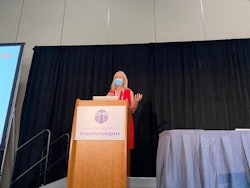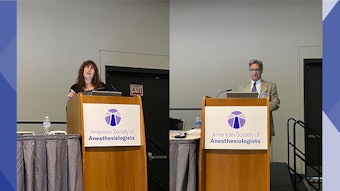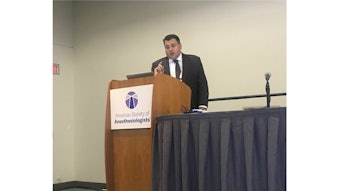COVID-19 and postoperative delirium
COVID-19 long haulers may be at increased risk for postoperative delirium.

Many older patients coming into the OR for elective surgery are cognitively impaired, which can impact postoperative outcomes. Studies suggest that delirium affects greater than 50% of hospitalized elderly patients and can have lasting effects, including ongoing cognitive impairment.
“But it’s not just the pathophysiology around surgery and anesthesia that could put patients at risk for delirium,” said Lis Evered, PhD, Visiting Associate Professor of Neuroscience Research in Anesthesiology at Weill Cornell Medicine in New York City. “Delirium could also be the result of an infection or some other trauma.”
In the 2021 session “Postoperative Brain Health: Still Foggy?, she said mounting evidence suggests that patients who have had COVID-19, not just patients with COVID-19 who have spent time in the ICU, but people who weren’t hospitalized with COVID-19, could be at risk for long-term cognitive and functional impairment. The possible pathophysiology pathway includes peripheral inflammation and a leaky blood brain barrier that results in neuronal damage.
How does this development impact surgery? It’s important to be aware that like advanced age, COVID-19 may be a risk factor for delirium. “Patients who have had COVID-19 may be at greater risk for poor physical and psychological recovery, compared to patients who have not had COVID-19,” Dr. Evered said.
During the preoperative consult, note whether patients who have had COVID-19 complain of COVID-19 long-hauler symptoms, such as fatigue, post-exercise malaise (not being able to exercise like they used to) cognitive dysfunction, and mental health disorders lasting four weeks to six months. “All ongoing symptoms need to be considered when further anesthesia and surgery are required,” said Dr. Evered, who is currently recruiting patients for the FOCUS-COVID study, which surveys patients within six to 24 months after a COVID-19 diagnosis.
Similarly, start assessing for perioperative delirium risk in older surgical patients at your institution, if you’re not already. “Preoperative cognition predicts postoperative delirium, but it’s hard to know if a patient is cognitively impaired unless you look,” said Gregory Crosby, MD, MS, an Anesthesiologist with Harvard Medical School, Brigham and Women's Hospital in Boston. Don’t think you can tell if patients are cognitively impaired just by talking with them in the preop visit. “Patients are very good at fooling you. If you don’t evaluate for delirium with a structured evaluation, you will get it wrong 50 percent of the time,” Dr. Crosby said.
A simple test, such as the Mini-Cog, a three-minute instrument that can increase the detection of cognitive impairment in older adults, is helpful for identifying patients at risk for postoperative delirium. During the test, patients are told to draw the hands of a clock at a specific time, such as at 10 after 11. The ASA’s Perioperative Brain Health Initiative has resources to reduce the chances of postoperative delirium for patients identified to be at risk. “Delirium is easier to prevent than it is to treat; 30 to 40 percent of causes are preventable,” Dr. Evered said.
Visit Anesthesiology Today Annual Meeting Edition for more articles.










![Sharks[2]](https://img.ascendmedia.com/files/base/ascend/hh/image/2021/10/Sharks_2_.616369899ebe1.png?auto=format%2Ccompress&bg=fff&fill-color=fff&fit=fill&h=191&q=70&w=340)
